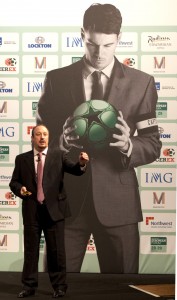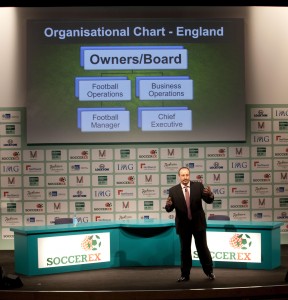Soccerex European Forum – Manchester (March 2012): Prepare to Succeed – The Art of Management
Day 1: Wednesday 28 March 2012
14:00 – 15:00 Prepare to Succeed – The Art of Management
- Guillem Balague (Sky Sports football expert) [Moderator]
- Rafa Benitez (Former Valencia, Liverpool & Inter Milan manager)
 Rafa Benitez opened his presentation by saying that the modern manager was one that had to adapt and move quickly with the changing times. The modern coach or manager has so much more information at their disposal, from sources such as Opta and Prozone. Having worked in England, Spain and Italy he is ideally placed to talk about the different ways clubs in these countries operate. For example he outlined possible operational models in England and Europe:
Rafa Benitez opened his presentation by saying that the modern manager was one that had to adapt and move quickly with the changing times. The modern coach or manager has so much more information at their disposal, from sources such as Opta and Prozone. Having worked in England, Spain and Italy he is ideally placed to talk about the different ways clubs in these countries operate. For example he outlined possible operational models in England and Europe:
English Clubs are run by Owners or a Board, with responsibilities for Football Operations and Business Operations. The Manager being responsible for Football Operations and the Chief Executive in charge of Business Operations.
European Clubs are run by Owners, or a Board and maybe even a President. As in England they have the same responsibilities in terms of Football and Business Operations. In respect of Football Operations there can be a Football Director who works with the Head Football Coach. As in England, the Chief Executive takes charge of Business Operations.
As to which is better, Benitez stated that it was really culturally dependent, as both work. However, whatever the model, clubs will have objectives and illustrated what might constitute ‘Acceptable’ and ‘Successful’ outcomes:
| ACCEPTABLE | SUCCESSFUL |
|
|
|
|
|
|
|
|
|
 Benitez also highlighted that to succeed as a manager you need to understand what motivates players. However, this varies greatly, with different approaches taken for example by Sir Alex Ferguson, Vicente del Bosque and Harry Redknapp.
Benitez also highlighted that to succeed as a manager you need to understand what motivates players. However, this varies greatly, with different approaches taken for example by Sir Alex Ferguson, Vicente del Bosque and Harry Redknapp.
He also added that success for a Manager comes from a mentality where, victory is normal, not the exception; team success is paramount and the manager is eternally dissatisfied.
Clubs which had effective football and business plans would in Benitez opinion have stability and the ability to progress. Under the guidance of a Finance Director, the manager would be clear as to the budget available and the wage bill, and therefore its impact on squad numbers and level in relation to the competitions the club was involved in.
Benitez outlined that an effective Football Operations plan, included a sound structure and organisation, a progressive Academy and an analysis structure that reviewed playing resources and made decisions. In terms of Academy players, Benitez argued that the introduction of UEFA’s Financial Fair Play (FFP) rules will drive clubs to produce more of their own players. He favoured a holistic approach so that there is development both as a player and as a person. What could help clubs is having a consistent approach, so that the model of play, systems and coaching is the same at all levels. This ideally would see talent progress from the Academy through the reserves to the first team. However the reality is that this is not producing enough players.
In terms of the focus of a club, Rafa Benitez stated that the obvious priority is the first team and therefore an associated football plan:
| Objectives A | Objectives B |
|
|
|
|
|
|
|
|
|
|
|
|
|
How are Objectives B achieved?
- Understanding the city, the culture and the club;
- Quality Medical Staff, full player records which are updated and analysed to prevent (where possible) injuries;
- Pro-actively manage scouting department;
- Data analysis – Amisco, Opta, Prozone etc. Conditioning data. Player Summaries.

Rafa Benitez is without question an advocate of data and analysis in football, but recognised that it has to be focused and backed with the right knowledge so that a balanced approach can be established. As an example he believed that his database of information relating to the analysis of penalties was vital for Liverpool when they won the shoot-out in the 2005 Champions League Final.
He argued that ‘Player Rotation’ is part of the modern game, with analysis used to make the most effective decisions. He added that change was necessary, since figures showed that modern players cover twice the distance of those from the 1950’s and 60’s and therefore resting has to be built into the season.
Rafa Benitez ended his presentation with the following quote: “…Managers in modern times have to be competitive with a passion for the game and new ideas that they can explain and defend without losing the old basic principles and team spirit…”
The session then continued with questions from the audience. First up was a question regarding how the ex-Liverpool boss viewed ‘mind-games’. He said that he didn’t believe they were important and that if you had a good team that was the position of strength. Also, many foreign players didn’t read the papers, so were often not aware of any’ mind-games’ being played. The main thing for players and managers was to focus on the job in hand.
Guillem Balague then asked Benitez what he had meant by his quote about manager’s being “…externally dissatisfied…” in that did it mean it was a lonely position. Benitez explained that for players they could express their dissatisfaction or complain through Facebook and Twitter. A manager or coach has to understand what motivates his players to deal with this.
A question was then posed from the audience about job offers now and in the future, given that Rafa Benitez had been out of management since December 2010. He said that he was looking to get back into the game in the Premier League. Benitez added though it would have to be at a club which had the financial backing to be title winners. He backed his abilities saying that he had proved he could win trophies and had a methodology he belived in and it was about improving clubs. There was a follow-up question which asked if a return to Anfield would ever be considered. Benitez said that there was no way he would go back now as Kenny Dalglish was in charge and had the backing of the owners. However, if he had to wait 10 years, he would happily go back.
Staying with Premier League teams, a question was poised as to why Manchester United and Manchester City were out of the Champions League whilst Chelsea had progressed. Rafa Benitez replied that there were a number of things to consider. Firstly, that other teams in Europe had improved, secondly in the case of Chelsea, their experienced players had regained belief showing that they are still a strong team. Lastly, the Premier League is still more about the physical game, the ability to go ‘box to box’ and less tactical. Ideally there should be a balance.
A question was asked about the relationship between managers and the media, which Benitez answered comparing England with Italy and Spain. In England there are the rounds with the papers, television and radio in a pretty formal arrangement. However, in Italy and Spain, the media is more intrusive with a greater presence on the training ground and even in the dressing room. He added though that the style in Spain tended to be more ‘off the record’, whilst in Italy it was more tactical.
There was an interesting question poised as to the importance of groundsmen at a club. Benitez responded that in Europe they had little regard, whereas in England they were well respected. He added that pitches were important and he insisted that the playing surfaces for matches and training were of the same standard. As a rule he thought it was prudent to have English staff at an English club for the cultural understanding they provided.
Guillem Balague took Benitez back to the UEFA Champions League Final of 2005 in Istanbul and asked what he said to the players at half-time. The ex-Liverpool boss simply said that he asked the players to play for pride and for the fans and that if they got a goal they would be back in it. He added that in tactical terms, Liverpool reverted to playing three at the back and pushed and pressed further up the pitch.
The final question to Rafa Benitez asked if he ever felt distracted by all the stats and figures in football today. His response was that computers allowed information to be managed and that as a coach he wanted all the information he could get. It was obvious to anyone in the audience that Benitez is a manager who has great faith in technology and during his presentation he demonstrated ‘Globall Coach’, an app he developed with his technical team. It is designed for use as a planner, organiser and visual coaching tool for all types of coaching sessions. It also can be used to prepare for matches by designing animations on tactics and movements to be used by both teams in a forthcoming match, as well as a scouting tool. Having been out of management for 15 months Rafa Benitez is now looking to get back into management. However, quite where that opening might be is up for debate right now.